Serving 440 students in grades Kindergarten-8, Kestrel Heights School ranks in the bottom 50% of all schools in North Carolina for overall test scores (math proficiency is bottom 50%, and reading proficiency is bottom 50%).
The percentage of students achieving proficiency in math is 29% (which is lower than the North Carolina state average of 51%). The percentage of students achieving proficiency in reading/language arts is 39% (which is lower than the North Carolina state average of 50%).
The student:teacher ratio of 15:1 is equal to the North Carolina state level of 15:1.
Minority enrollment is 92% of the student body (majority Black), which is higher than the North Carolina state average of 57% (majority Black and Hispanic).
Quick Stats (2025)
- School Type: Charter School
- Grades: Kindergarten-8
- Enrollment: 440 students
- Student:Teacher Ratio: 15:1
- Minority Enrollment: 92%
- Overall Testing Rank: Bottom 50% in NC
- Math Proficiency: 29% (Btm 50%)
- Reading Proficiency: 39% (Btm 50%)
- Science Proficiency: 50-54% (Btm 50%)
- Source: National Center for Education Statistics (NCES), NC Dept. of Education
School Overview
Kestrel Heights School's student population of 440 students has declined by 21% over five school years.
The teacher population of 30 teachers has declined by 23% over five school years.
School Type
Grades Offered
Grades Kindergarten-8
(offers virtual instruction)
(offers virtual instruction)
Total Students
440 students
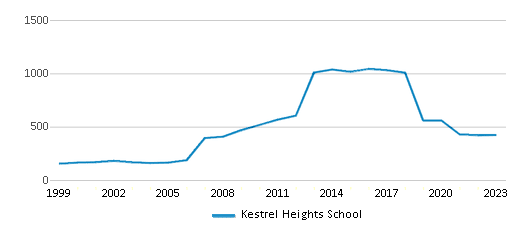
Gender %
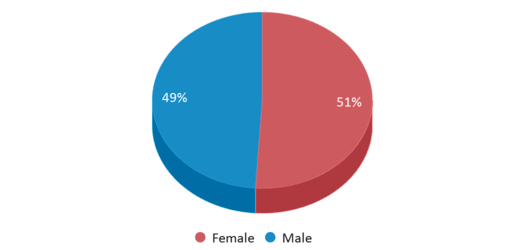
Total Classroom Teachers
30 teachers
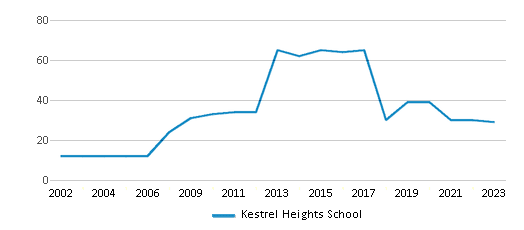
Students by Grade
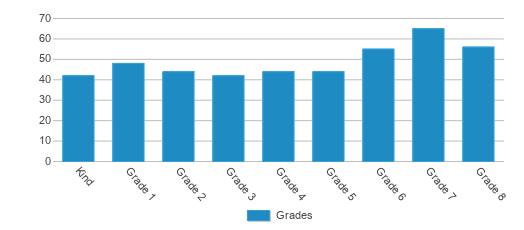
School Rankings
Kestrel Heights School ranks within the bottom 50% of all 2,617 schools in North Carolina (based off of combined math and reading proficiency testing data).
The diversity score of Kestrel Heights School is 0.62, which is less than the diversity score at state average of 0.71. The school's diversity has stayed relatively flat over five school years.
Overall Testing Rank
#2060 out of 2617 schools
(Bottom 50%)
(Bottom 50%)
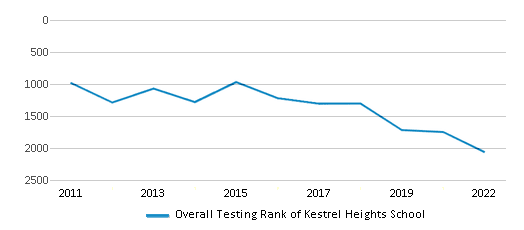
Math Test Scores (% Proficient)
29%
51%
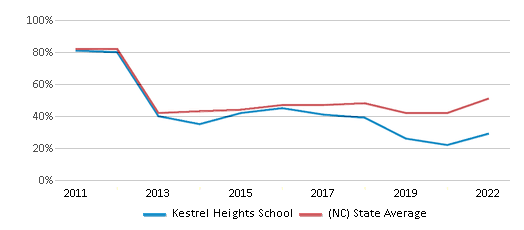
Reading/Language Arts Test Scores (% Proficient)
39%
50%
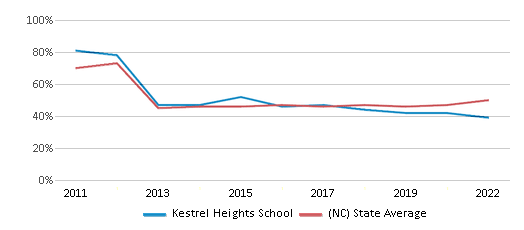
Science Test Scores (% Proficient)
50-54%
63%
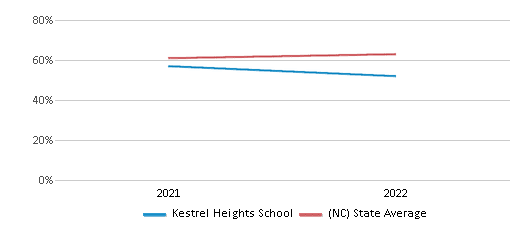
Student : Teacher Ratio
15:1
15:1
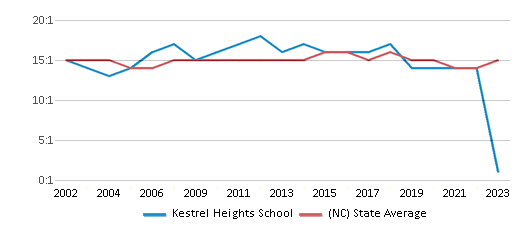
American Indian
n/a
1%
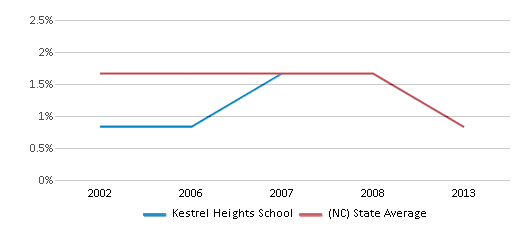
Asian
6%
4%
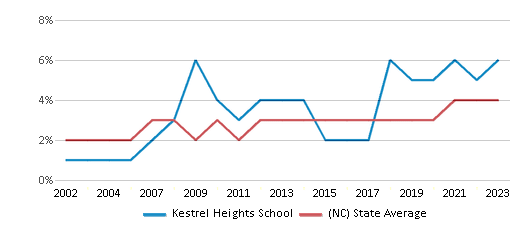
Hispanic
21%
21%
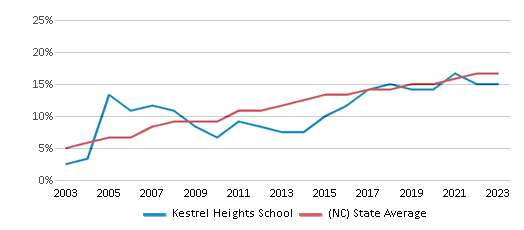
Black
57%
25%
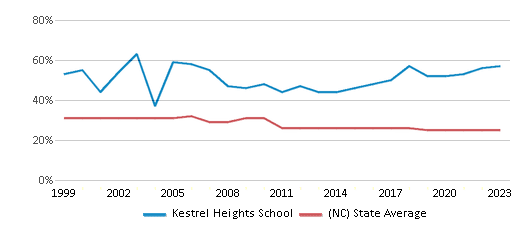
White
8%
43%
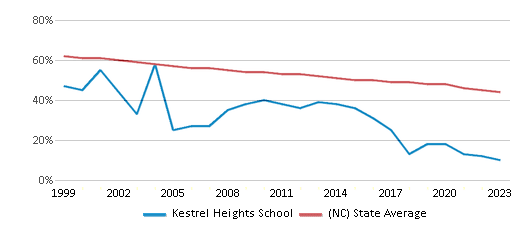
Hawaiian
n/a
n/a
Two or more races
8%
6%
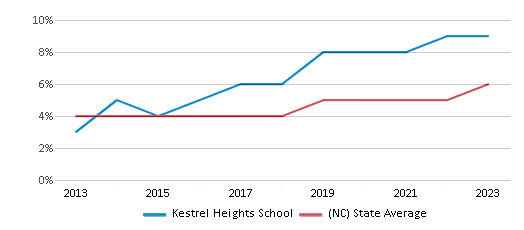
All Ethnic Groups
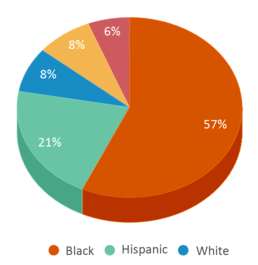
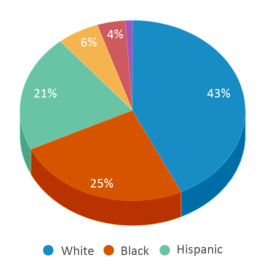
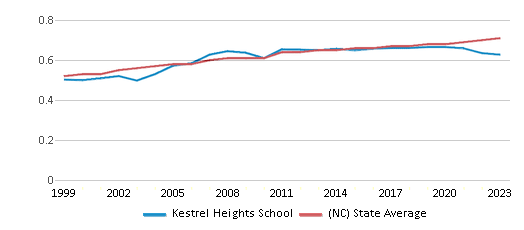
Eligible for Free Lunch
53%
68%
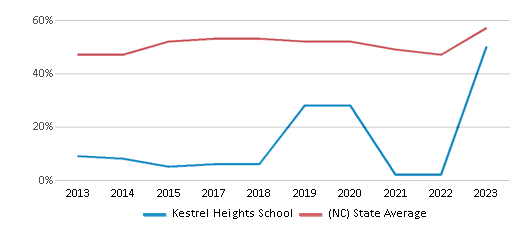
Eligible for Reduced Lunch
1%
1%
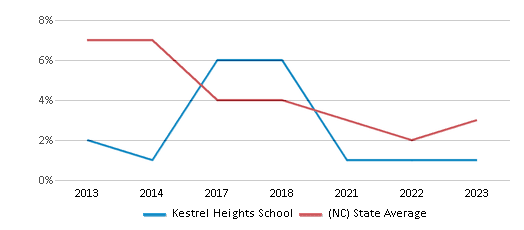
School Statewide Testing
School District Name
Sports
Total Sports Offered
12 sports
Sports
Baseball, Basketball, Cheering, Cross Country, Cross Country Running, Dance, Soccer, Softball, Track, Track and Field, Ultimate Frisbee, Volley Ball
Extracurriculars
Total ExtracurricularsTotal Extra-curric.
3 extracurriculars
ExtracurricularsExtra-curric.
Club or Organization:
Model UN, Student Government
Arts and Music Programs:
Band
Model UN, Student Government
Arts and Music Programs:
Band
Source: National Center for Education Statistics (NCES), NC Dept. of Education
School Notes
- Kestrel Heights School, located near the Research Triangle Park in Durham, is a public charter school established in 1998. Beginning in Fall 2017, the school will focus exclusively on elementary and middle school students with approximately 600 students in Kindergarten through 8th Grade.The Kestrel Heights team believes that all children can succeed. We provide a diverse and welcoming environment where academics are emphasized, creativity is celebrated, and children are encouraged to excel.By fostering a community with high expectations, modeling characteristics of responsible citizenship, and focusing on the development of the whole person, we aim to nurture lifelong learners.
Profile last updated: 02/09/2025
Frequently Asked Questions
What is Kestrel Heights School's ranking?
Kestrel Heights School is ranked #2060 out of 2,617 schools, which ranks it among the bottom 50% of public schools in North Carolina.
What percent of students have achieved state testing proficiency in math and reading?
29% of students have achieved math proficiency (compared to the 51% NC state average), while 39% of students have achieved reading proficiency (compared to the 50% NC state average).
How many students attend Kestrel Heights School?
440 students attend Kestrel Heights School.
What is the racial composition of the student body?
57% of Kestrel Heights School students are Black, 21% of students are Hispanic, 8% of students are White, 8% of students are Two or more races, and 6% of students are Asian.
What is the student:teacher ratio of Kestrel Heights School?
Kestrel Heights School has a student ration of 15:1, which is equal to the North Carolina state average of 15:1.
What grades does Kestrel Heights School offer ?
Kestrel Heights School offers enrollment in grades Kindergarten-8 (offers virtual instruction).
What school district is Kestrel Heights School part of?
Kestrel Heights School is part of Kestrel Heights School District.
School Reviews
5 10/11/2022
This is a very gifted school many intelligent people attend this caring, loving, and welcoming school. I give it a five at rating because my children have come out very brilliant and well-rounded. They have learned how very social and sophisticated.
Review Kestrel Heights School. Reviews should be a few sentences in length. Please include any comments on:
- Quality of academic programs, teachers, and facilities
- Availability of music, art, sports and other extracurricular activities
Recent Articles

What Is A Charter School?
Explore the world of charter schools in this comprehensive guide. Learn about their history, how they operate, and the pros and cons of this educational innovation. Discover key facts about charter schools, including admission policies, demographics, and funding, as well as what to look for when considering a charter school for your child.

10 Reasons Why High School Sports Benefit Students
Discover the 10 compelling reasons why high school sports are beneficial for students. This comprehensive article explores how athletics enhance academic performance, foster personal growth, and develop crucial life skills. From improved fitness and time management to leadership development and community representation, learn why participating in high school sports can be a game-changer for students' overall success and well-being.

February 05, 2025
Understanding the U.S. Department of Education: Structure, Impact, and EvolutionWe explore how the Department of Education shapes American education, from its cabinet-level leadership to its impact on millions of students, written for general audiences seeking clarity on this vital institution.









